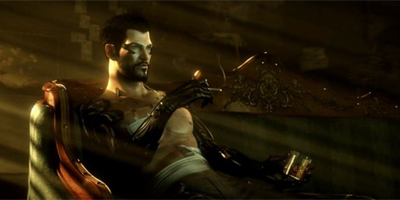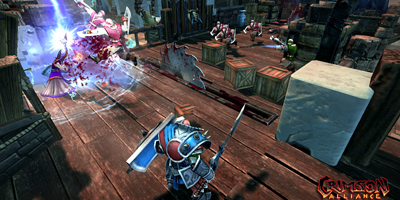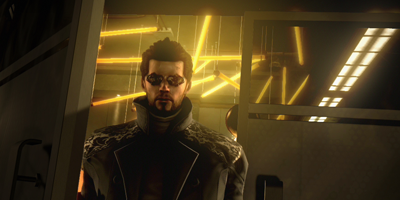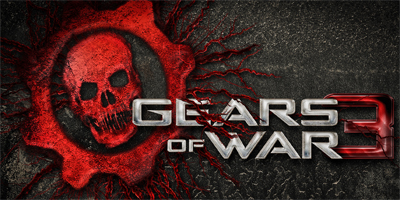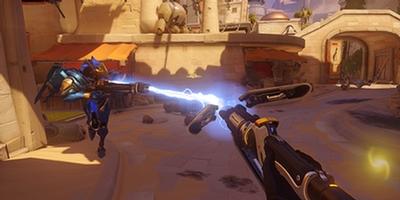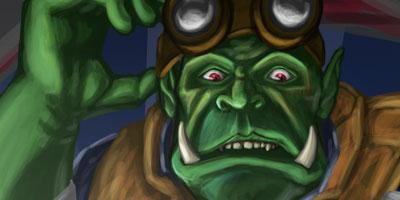
- by Ken "Chaobo" Serra
- Posted on August 26, 2011 @ 3:29 PST
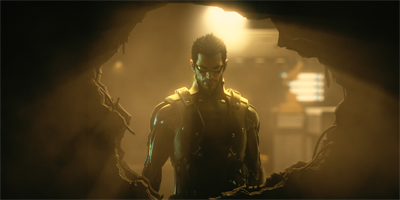
Deus Ex: Human Revolution
Genre: Action

The ESRB has rated this product:
Mature
Mature
08/23/2011 ( PlayStation 3,Win PC,X-Box 360 )
Desc:
At a time when scientific advancements are routinely turning athletes, soldiers and spies into super-enhanced beings, someone is working very hard to ensure mankind's evolution follows a particular path. You need to discover why - because the decisions you take and the choices you make will be the only things that can determine mankind's future. Deus Ex: Human Revolution is an action-adventure game developed by Eldos Montreal and published by Square Enix for the PlayStation 3, Xbox 360 and PC.
Developer: Eidos Montreal
Publisher: Square Enix
Genre: Action RPG
ESRB Rating: M
Release Date: August 23, 2011
Platforms: PC, PS3, Xbox 360
It’s very difficult these days for companies to create a very enjoyable single-player experience to compete with the range of multiplayer games consumers have to choose from. With games like Fable (Errr…), Dragon Age (Mmm…), and Mass Effect (Yay….) already out on the market, and with more installments on the way, it’s not the easiest task for developers to craft a contender to oppose these already infamous titles. But a new hidden title has come out of the mist, one with much more history than any of today’s big releases.
The original Deus Ex, released in 2000, was considered one of the most revolutionary games of its time and was even dubbed “The Best PC Game of All Time”. Afterwards in 2003, the sequel, Deus Ex: Invisible War was released, not as well-received as the original. And now after a good long seven years, Eidos Montreal has finally decided to release the next installment to the Deus Ex series, Human Revolution. DE: HR is actually a prequel to the original game and reveals some of the answers left unsaid as to how everything came to be. Taking place in 2027 during the rise of human augmentation and before the creation of UNATCO, players will get to enjoy an extremely well thought-of sci-fi world like no other.
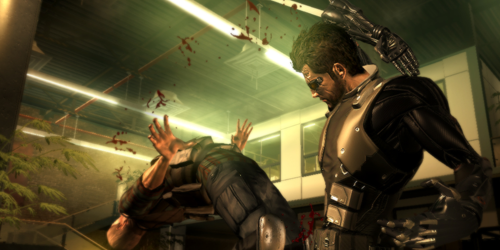
Dark, dismal, and epic… “What you see is what you get.”
As far as visuals go, the graphics themselves aren’t as top-notch as some of the games out in the market today; they’re not bad at all but they could be better. However, I will give props to the developers in making the players feel like they’re in the game. The world you are given is compact, yet so vast and very “real”. The atmosphere in the city and many of the missions is very dark and gives off a vibe of unknown despair similar to that seen in Halo 3: ODST. This gives the player a visual means to understand that the world in Deus Ex… isn’t exactly going so well. It is a time of chaos and conspiracy and there is a big presence of dehumanization; plenty of conflict between the civilians (pro vs. anti-human augmentation), “bad” area in the city that you may explore (plenty of homeless people, gangsters, turf wars), and obviously the augmentation of human beings.
To top off all the dark and gloomy eye candy is the outstanding variety of sound the game has to offer. You can hear the sound of the train, the birds, the fire in the alleys, everything. As you walk through the city, the slew of dialogue you can over hear from the NPCs help immerse you in the game. None of it is really wasted either, and though some of it is indeed funny (the unintelligent comments of drug dealers in the back alley), it’s all very relevant to the setting. The BGM is also fantastic. It’s not quite “epic” per say, but it’s very tense and rather futuristic; fitting for whatever situation you’re in. It especially brings the moment to the player during parts of the game that require stealth and thinking.
Another thing I need to blab on about most is augmented Adam Jensen. Might I say the developers did a very good job of making him look like a badass, very fitting for what the player intends to do in the game, which is feel like a badass. I mean, physically, he looks like Neo from The Matrix. He has the sunglasses and the very empowering trench coat. Combined with his stern face and bionic arms, it all just screams “I’m going to shove a pipe down your throat”. Let’s not forget how he is vocally… and honestly, he reminds me of Clint Eastwood with his deep voice and small sentences that are capable of punching people in the face… yea what else can I say? The main character is awesome, what more could you ask for?
The only problems I have encountered in-terms of the game’s aesthetics is the voice-acting. At times, it can be a little “odd” primarily on facial-expression to tone basis. I mean, some of the characters have the same expression whether they’re just talking, crying, happy, whatever. This doesn’t appear to be an issue with primary characters you see more often than the rest.
Metal Gear meets Gears of War meets Mass Effect?
The gameplay is where Deus Ex shines. All the fundamentals to a game like this are present; elements of customization, good combat, character interaction, and of course, the tedious yet fun little mini-game you do when you’re hacking that more often than not has made me cringe.
In terms of combat, the game is a more “slow-paced” shooter because of the stealth element. A smart game you can call it. One for the intelligent mind, which is really cool. Being a pro gamer, I found it really enjoyable to finally use mind over adrenaline in my gameplay and go through whole missions without killing a soul. Yes, Players can go through an entire mission without killing anyone, or better yet, never even directly engage anything which gives the game a “puzzle” element and all you avid shooters a break from the chaos that is Call of Duty and Halo.
Of course, that won’t stop players from just walking into a room as the augmented devil and kill everything in plain sight. Some of which could bring forth some intense, heated firefights. Players will enter into a Mass Effect/Gears of War style of combat complete with your very own cover-to-cover and blind fire system. When you want to switch weapons and check your inventory, the game “pauses” much like it does in Mass Effect, giving the player breathing room, and in-game, the illusion of quick-swap. Despite how awesome you are, enemy bullets hit like a truck. It doesn’t take much to kill Adam and should you win a heated firefight, be very proud of yourself, because you just earned the Medal of Badassery. Of course, I’ll also give anyone props for killing a boss drunk off a bottle of whiskey. I accidently drank a bottle thinking it was a healing item and my vision became something people with motion sickness would vomit all-over.
However, stealth gamers will enjoy playing the missions in a very Metal Gear-esque fashion ( you even get your own Deus Ex rendition of Otakon) by hiding behind boxes, creating distractions with the sound of a faucet, and getting caught and running away to hide in vents. But when it comes to sneaking around, you are given tools that put Sam Fisher’s arsenal from Splinter Cell: Convictions to shame via Augmentations.
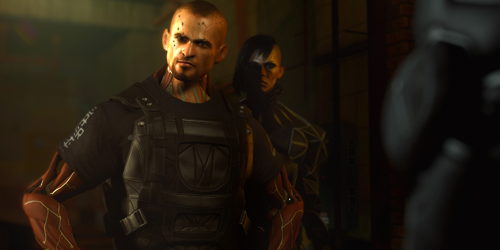
As you progress and gain XP, you will be given Praxis points that allow the player to upgrade Adam’s prosthetics with Augmentations. For example, one can augment Adam’s retina and allow him to see hostiles through walls or upgrade his arms to allow for heavier lifting and reduced recoil. Might I say, these upgrades aren’t just for “fun”… oh wait they are… but they also have a huge impact on gameplay because it affects how you’re going to play out a mission. I did not have my hacking abilities or my arms upgraded so certain paths that could have made my life less tense were made inaccessible, or much harder to reach. But because I had my inventory boosted, I was given the opportunity to carry every gun I came across, even a rocket launcher, allowing me to kill a big robot in my path, rather than going around the area to avoid it.
Speaking of inventory, the inventory system is pretty neat. It’s a big grid and each item takes up a set number of boxes within that grid. You may move items and arrange them however you want, allowing for a better fit of items you come across on your journey. More inventory space is earned via augmentations that add two columns of boxes at a time per upgrade.
Despite the tense gameplay that would naturally keep people hooked on trying to solve them and avoid things, the real element of gameplay in Deus Ex comes from the dialogue and interaction with the world around you. The world is so… there. It’s very real and you can toy around with it. You can talk to people and what you say or do them could ultimately affect the outcome of your journey in the future. Every thing you say to a character will have an impact in the game. Cause and effect. Because of this, multiple endings, outcomes, and situations are made possible because of player choice. An example was talking to an old friend of Adams to take a risk by granting you access to the police station. Should I have played that differently, I would’ve ended up having to sneak in through the back and I also would’ve “lost” a potential ally.
Deus Ex is a rather compact game. Not like the vast universe of mass effect. Rather linear yet is a sandbox title with plenty of outside questing and interaction to do in the city. I love how the game allows for individual player choices yet you are Adam Jensen. You make your own choices that benefit his ultimate goal.
There are plenty of hours of gameplay and tons of side-missions that any RPG fan will do to unravel the story within the story. Combined with your missions with Sarif Ind. you’re looking at about 20-30 hours of gameplay (on medium difficulty) and tons more hours of running the game using different pieces of dialogue, play style, and augmentations.

Technical Experience
I’m happy to say the game plays out very well, almost flawlessly. I haven’t really encountered any bugs; at least not any that were immediately noticeable by one play through. The controls could be better I suppose, but I say that because I’m used to playing so many other games (COD/Halo, Gears of War, Splinter Cell, Ghost Recon, Rainbow Six, and the list goes on). They were so different and there was no way of changing them, they’re as hard as the science behind augmentations. Despite my level of skill at many games, these controls took quite awhile to master which was annoying simply because I had a plan thought of in my mind that I could not execute because of a control slip-up. I’m not going to put down the game just because of some user-error, but when you take so many elements from other games, try and cater the controls accordingly if possible. At first, the controls give off the illusion of clunkiness, but once mastered, were actually quite smooth.
Another complaint I have (well it’s more funny if anything) is when you go for a takedown, you enter into a quick cinematic where Adam absolutely beats the opponent down and knocks them unconscious. No matter how dramatic you are at subduing your opponent (grabbing their wrists and making them do flips), no one around you seems to notice, despite the stealth element of the game. It’s alright, because what Adam does in these cinematics is just amusing to watch.
In addition to that, “dragging” a body could be better. Once you “pick them up” it gives them a sort-of rag doll effect which actually is more amusing if anything. I’m still unsure whether Adam picks them up physically or uses his mind.
Despite what I had to say here, none of it really affects overall user-experience. The controls could be learned and rag-doll effects on the body don’t crash your gaming platform so none of it is harmful.

A story within a story
I have to try and write this without spoiling anything because the story itself is rather linear like most RPG games. And we all know what’s going to happen as it is a prequel and the game does indeed lead to the creation of UNATCO, the organization the protagonist in the original Deus Ex works for. But what makes the story in this game so unique? Unless you’re cold-hearted, you can feel for the characters, especially protagonist, Adam Jensen.
The game begins with a sort of epilogue-tutorial that sets the story in motion. And to keep things short, this portion of the game reminds me of RoboCop. You play as pre-augmented Adam Jensen, get a tour of Sarif Industries and understand what they do, get under attack by a group of augmented mercs, watch everyone around you die, have your girlfriend save you at the cost of her life, and even get “killed” a long the way. The opening credits begin and it shows you basically being rebuilt. Watching what Adam goes through makes me want to kill every last one of the mercenaries that did what they did.
Don’t worry I didn’t spoil any of the game for you. The real meat of the story happens later. But as you play Adam; your ultimate goal is to find out why Sarif was attacked and who was responsible.
Aside from the story you know you have to follow by the end of your journey, there are plenty of other plot lines for you to venture in to. Everyone around you seems to have been involved in the incident with Sarif and it’s up to you to talk their share of the story out of them. There are also plenty of mini-stories all around you. Stories of the people who are for or against human augmentation. Stories of old friends. Stories of people who are totally irrelevant. If you’re a big reader, you can choose to walk around and read every e-book you find in the game to know about people’s lives and what not. You can literally immerse yourself and be one with the world created in Deus Ex. And with how things are going today, the future crafted in the game doesn’t seem too far off from us. An understanding of the world around you in video games is a good thing and DE: HR does not fall short at all on this.
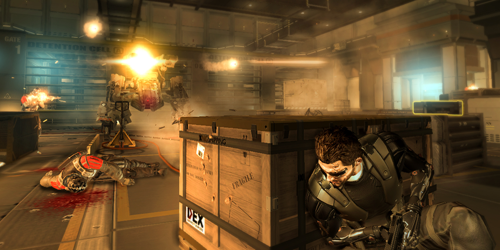
Overall
The game Deus Ex: Human Revolution isn’t as revolutionary as the original Deus Ex, but it gets the job done. It immerses players in a sci-fi world true to its story and unravels several mysteries leading onto to its sequel. It’s powerful and it tells the story very, very well. I grew attached to Adam Jensen and the characters around him and wanted to know more about the world they walk in.
If you base Human Revolution on direct gameplay alone, you’re missing the point. The game is a work of art. It’s a whole world for you to explore and learn. You may customize yourself as you choose and play the missions accordingly. Shooter and RPG-gamers alike should enjoy this prequel. The game should definitely at least be tried by players fond of Mass Effect and Metal Gear Solid. Just don’t go crazy and learn more about Deus Ex than our world.
tl;dr - Too long; Didn't read
Overall, the game is brilliant. Players will immerse themselves in an interactive world true to itself and the story. The gameplay mechanics are awesome and both weapon and body customization options are never wasted, affecting how you run a mission. How you play the game is up to you and reaching Adam Jensen’s ultimate goal is done your way.
Aesthetics: 5.0
GamePlay: 5.0
Story: 4.5
Quality: 4.5
Overall Score: 5.0
0 Comments for this post.
You must be signed in to post a comment.



